Food & Drink
Chef Carlos Raba Expands His Vision with Nana
Raba's new family spot in Stoneleigh is intentionally at the opposite end of the culinary spectrum as Clavel, the hip Remington taquería that earned him national attention. But he runs both kitchens with same level of authority, compassion, and attention to his own history.
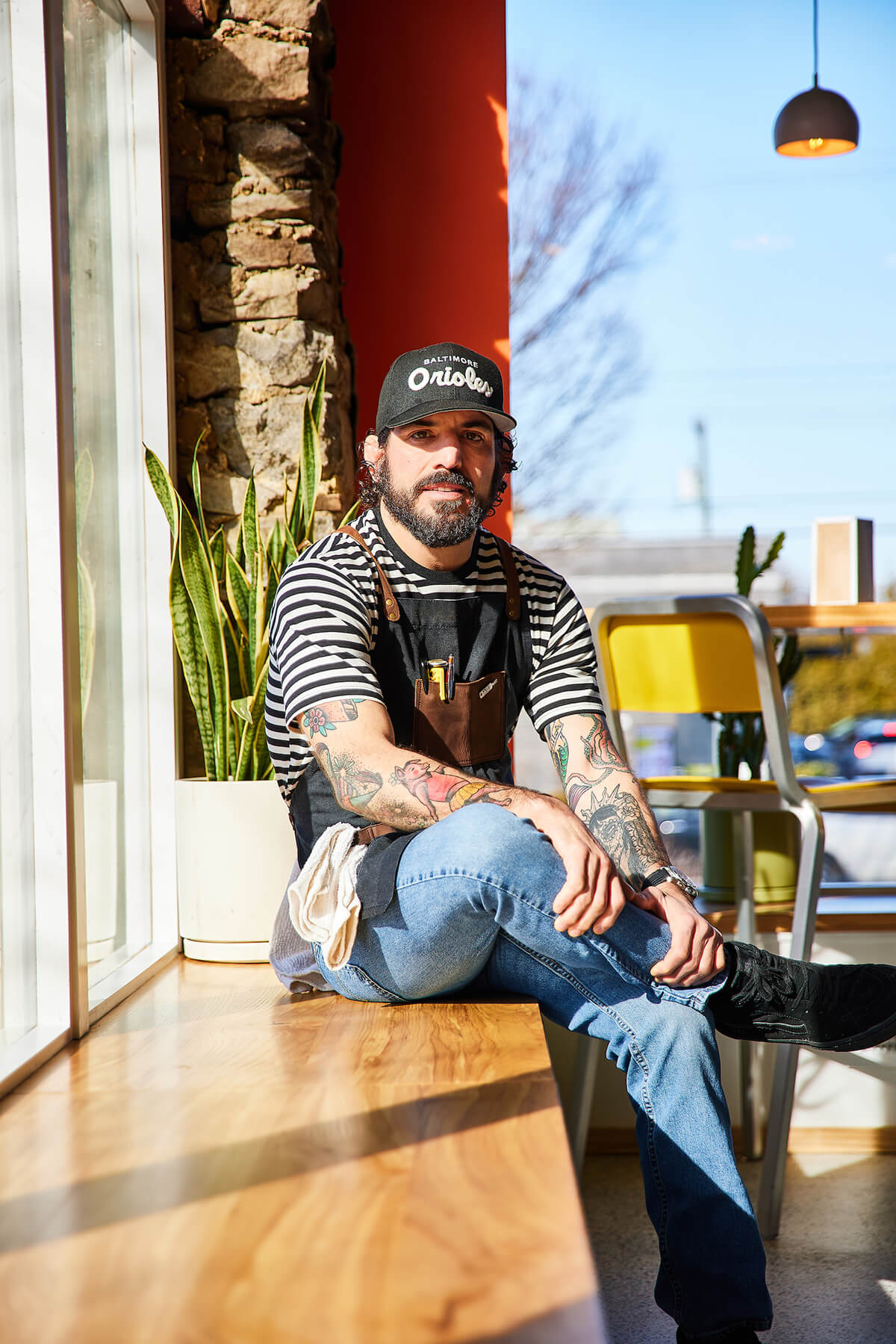
It’s late January, the opening day of Carlos Raba’s first solo restaurant, Nana, and the award-winning chef stands in the kitchen, channeling his nervous energy into the preparation of tacos.
In a mixture of English and Spanish, he calls out to his crew, who are busily making orders of tortas, quesadillas, and dogos—Sinaloa-style bacon-wrapped hot dogs paired with caramelized onions and avocado sauce. Behind him, a large rotisserie oven turns slowly, an abacus of golden chickens.
As he moves deftly around the restaurant—checking on the rotating birds, handing plates of tacos to customers, darting downstairs to take inventory of the supplies, and chatting with his staff—Raba’s energy and attention to detail are as apparent as his culinary skills.
What is also apparent is the joy he brings to the proceedings—it’s in his frequent smile, behind his voice, and in the food which is simple and comforting, the kind of fare he grew up with. It’s a far cry from Clavel, the hip Mexican restaurant in Remington that brought Raba to Baltimore and gave him a culinary career.
Located along York Road in Stoneleigh, Nana, named for Raba’s great-grandmother, is a bright, sunny space in a 1924 building that originally housed a pharmacy. It has wide windows, pale wood counters, and yellow chairs built around a big, central kitchen that showcases the rotisserie, a flat-top range and fryer, and a trompo spinning the roasting pork for the al pastor.
A warm pot of beans sits at one corner of the counter, a formation of Raba’s grandfather’s favorite habanero hot sauce at the other. A black-and-white photo of his great-grandparents, aunts, uncles, and cousins hanging on the wall is given the place of honor opposite the busy kitchen.
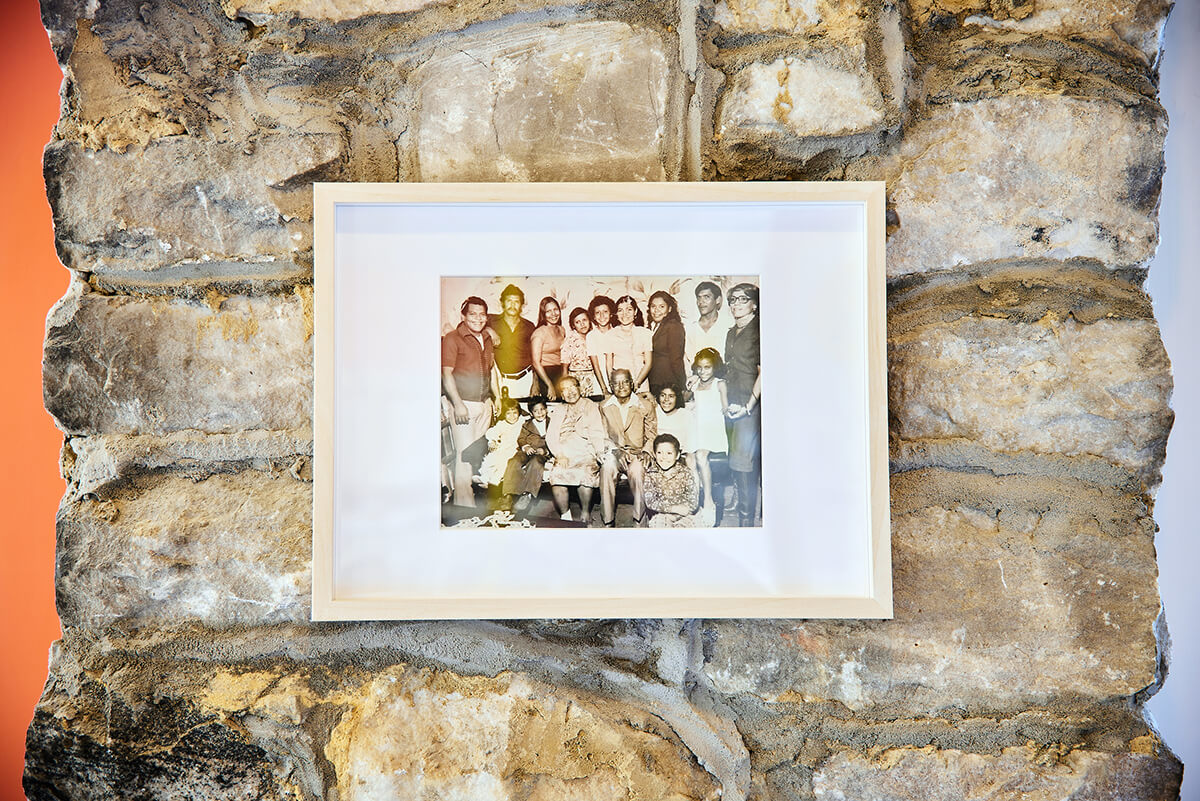
Raba is from Sinaloa, Mexico, and his journey to this Baltimore neighborhood street corner has been a circuitous and unusually dramatic one, an immigration story that involved politics, martial arts, murder—and the healing power of food.
Raba, 40, was born in Mexico City, where his parents lived at the time. His mother was a prominent journalist, his father a successful businessman who was murdered in a home invasion in 1983, two months before Raba was born. After the murder, his mother, Luz Aida Salomón, took Carlos and his older brother, Enrique, to her hometown of Culiacán in Sinaloa to live with his extended family of great-grandparents, grandparents, his mother’s four sisters, uncles, and cousins. Raba grew up in a compound of family houses, a happy childhood built around cooking, his uncles’ restaurants, and trips to local taquerías.
He was often cared for by his grandmother and his aunts while his mother worked. (“You would hear the typewriter all the time,” he says.) But Raba’s mother was a political journalist whose investigations into corruption, and the persecution she faced, eventually led her to seek asylum in the U.S. “They used to break into the house, and I was kidnapped a few times by the police,” says Raba of those days.
With the help of the human rights nonprofit Amnesty International, 16-year-old Raba, his mother, and brother relocated first to D.C., very briefly to Detroit—where they found themselves in a homeless shelter—then to Maryland. His mother, who was struggling with mental-health issues, eventually returned to Mexico, while Raba and his brother stayed in Maryland, where they lived for a time with the lawyer who helped relocate them, and where Raba went to high school and started working.
Over the next few years, he hustled to make ends meet, working on commission at Nordstrom and Safeway, then as a manager at Whole Foods and Giant. “I was a butcher, I was a cheesemonger, I was a store manager, a district manager, a trainer, I put out fires,” says Raba.
Meanwhile, Raba became interested in martial arts, specifically Brazilian jiu-jitsu, which provided a valuable, necessary outlet and re-engineered his outlook toward both his past and his future. In 2009, he met Claudia Carias, a D.C. native from a Guatemalan-Panamanian family, and they married and had a son, Lucas. His brother married and had kids, too, and the two brothers would regularly travel to Sinaloa to visit their extended family, including their mother, who now lives there in a retirement home.
Lane Harlan, who had opened the Remington bar W.C. Harlan with her husband, also became part of that extended family, as Harlan’s sister, Tiffany, married Raba’s brother, Enrique. Eventually, over family dinners in Culiacán, Harlan told Raba about her idea of opening a mezcaleria, and the two started thinking about opening a restaurant together. Not only were they family, but their interests fit perfectly together, pairing as well as, yes, mezcal does with tacos. They would call their restaurant Clavel, which means carnation in Spanish and is yet another hat tip to Raba’s flower-loving great-grandmother.
“We would have family gatherings and Carlos was always the one on the grill,” says Harlan. “He’s an incredible cook. [Both he and his brother] come from a family of people who embrace cooking; you can really tell these are family recipes.” When Clavel opened, “the menu started off with all of the recipes that we just ate together.”
By 2022, the cooking at the beloved Remington taquería would earn Raba a James Beard Best Chef: Mid-Atlantic nomination. The national attention expanded the chef’s growing fan base, and Baltimoreans’ hunger for more of his cooking added momentum to Raba’s quest for his own restaurant.
Back in Nana’s kitchen, Raba monitors his roasting chickens. He’s wearing an Orioles cap and a thick black canvas apron over a T-shirt; his arms are covered with tattoos, including a detailed mauve octopus that winds down from under one sleeve.
“As I get older, food makes more sense to me,” he says. “[There are] flavor profiles that I didn’t see before.”
The great-grandmother for whom Nana is named taught Raba’s grandmother how to make the flour tortillas that are now the foundation of the taquería’s menu, and she in turn taught Raba’s aunts and Raba himself. His grandmother is also responsible for Nana’s roasted cauliflower tacos. “My grandmother was a big cauliflower person,” says Raba.
Though Nana also offers its own house-made corn tortillas, it’s the flour tortillas, a Sinaloan staple that they press and griddle and sell by the dozen, that are the house specialty. “My hands were the ones that always were making flour tortillas,” says Raba.
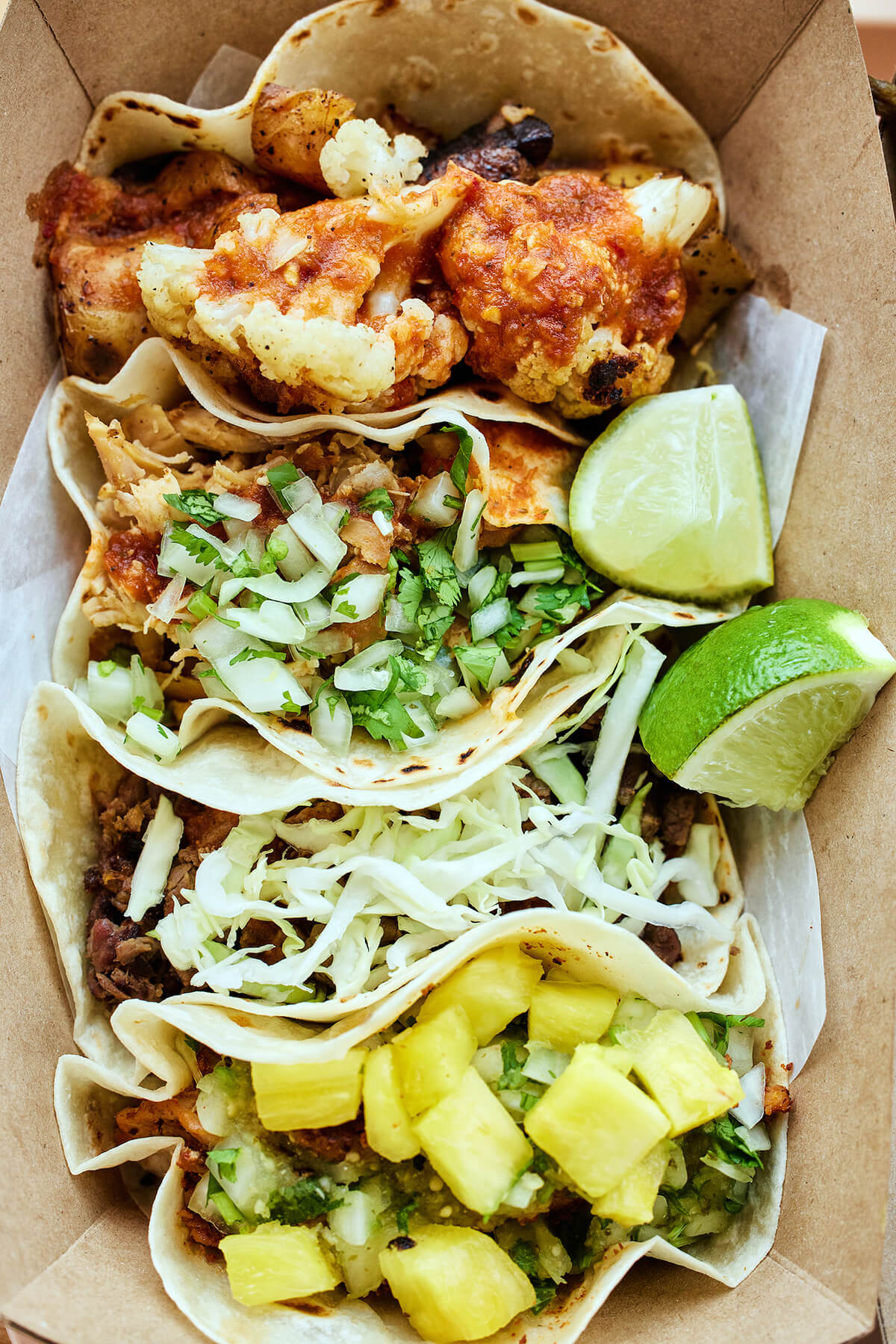
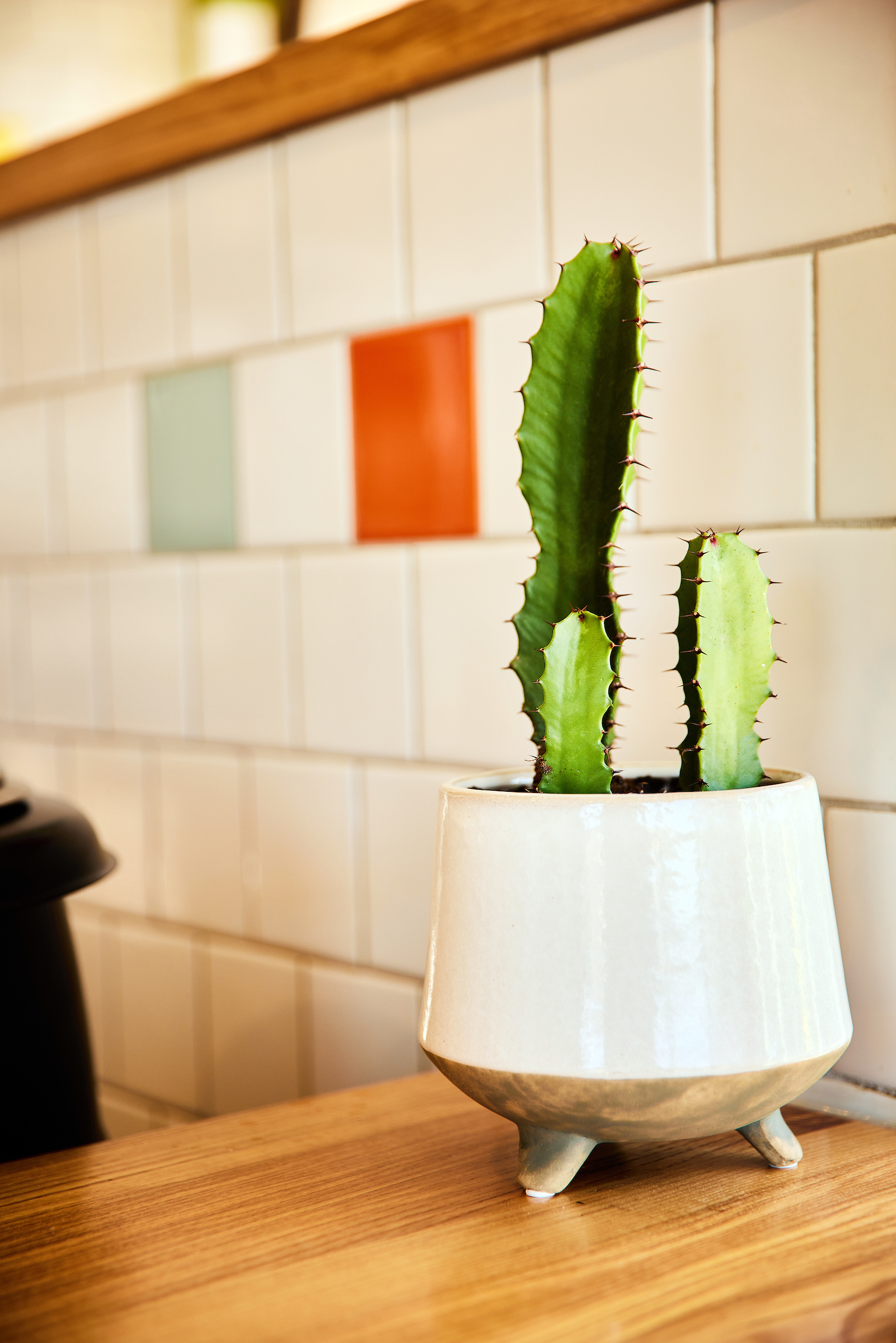
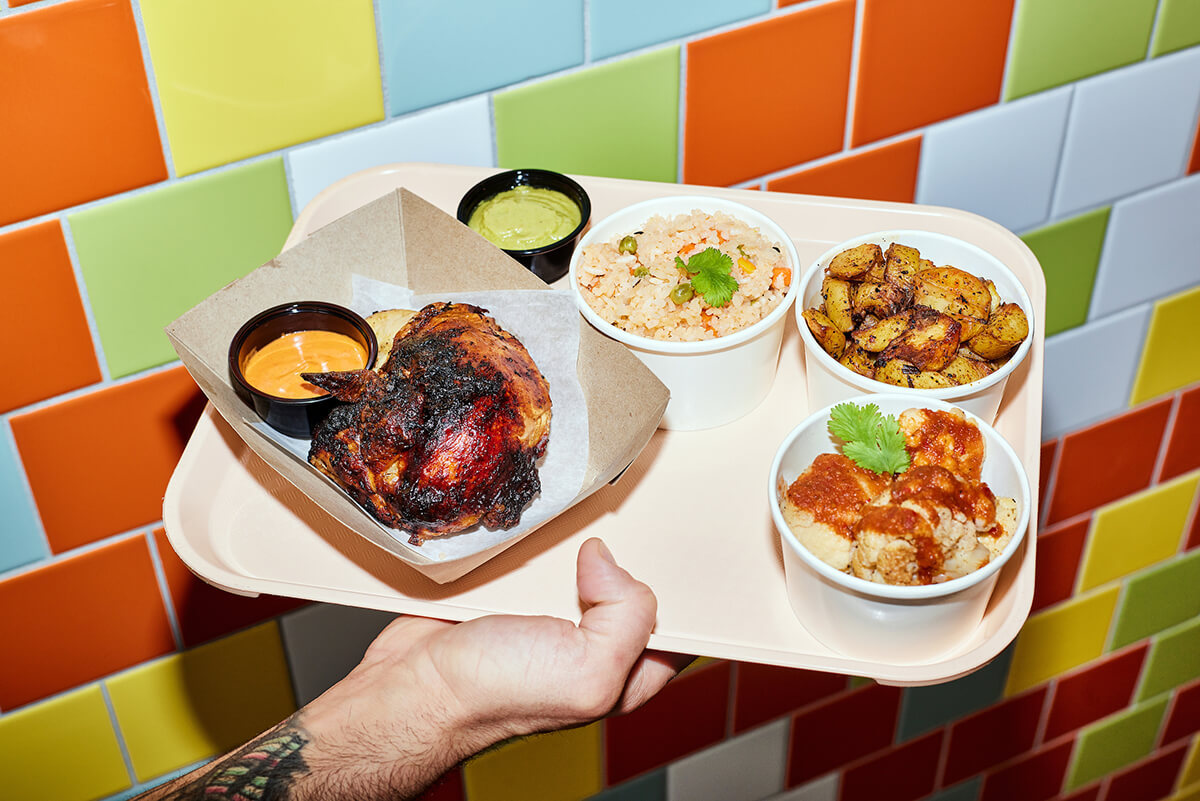
While Raba borrows many recipes from his family—the tortillas are his great-grandmother’s; Clavel’s barbacoa and cochinita pibil are from Raba’s aunts; the carne asada traces to his uncles’ restaurants—the rotisserie chickens are very much his own.
Brined for 24 hours, then dried for another 24, each two-and-a-half-pound chicken is trussed, then impaled on the metal rods of the French-built rotisserie like some medieval experiment. Marinated in two iterations—smokey al pastor and an herby-garlicky version—they’re then roasted until burnished, crisped, and impossibly flavorful, the rich schmaltz from the chickens in turn flavoring a tray of potatoes roasting in the bottom of the machine. The chickens are sold whole, by the half or quarter, and also deconstructed, chopped, and loaded onto tortillas with salsa, onions, and cilantro.
“The chicken is me,” says Raba. “I love chicken tacos.”
Nana’s open kitchen is cheery, light-filled—and immaculate, the plancha cleaned so pristinely after use that Raba presses his apron on it in the mornings. It took Raba two and a half years to open Nana, thanks to the challenges of rebuilding a location that had stood empty for years (“We had to take out trash from the 1960s”), pandemic delays, inspections, hiring, training, menu development, and the like.
With Nana, Raba wanted a neighborhood taquería, a safe place where families and kids could come for affordable food and community.
“I’m trying to think of this as a legacy,” he says, “because I never met my father. It’s very important for me to have my kids and the people around me, and to show them my passion, and what I do with my passion, and how I handle it.”
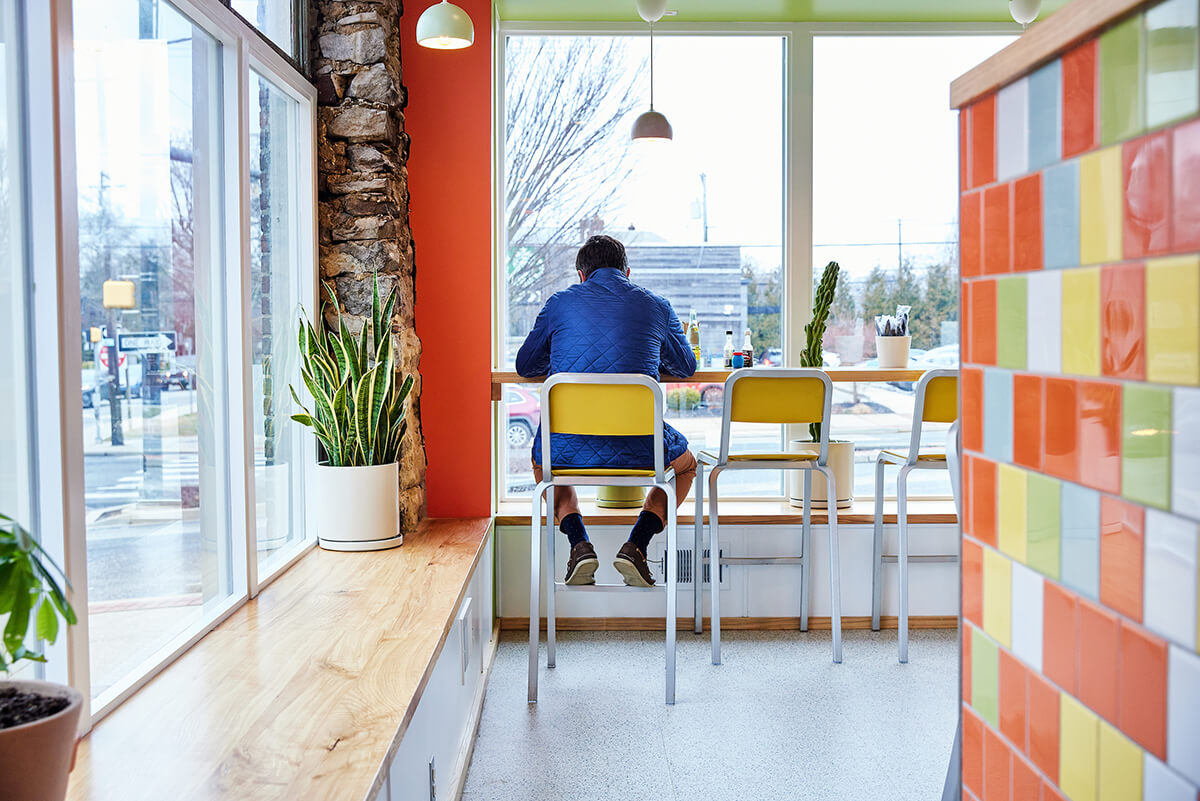
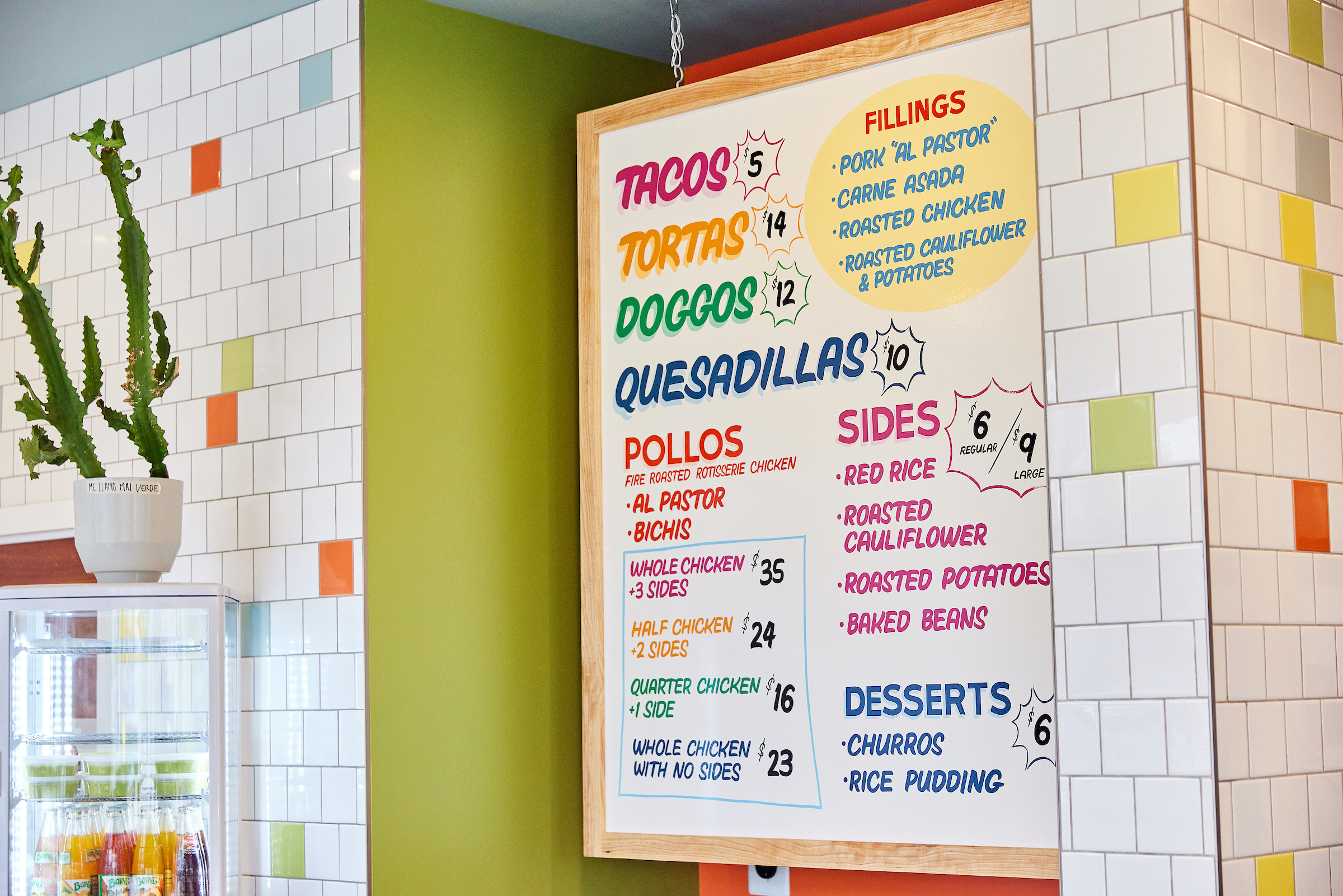
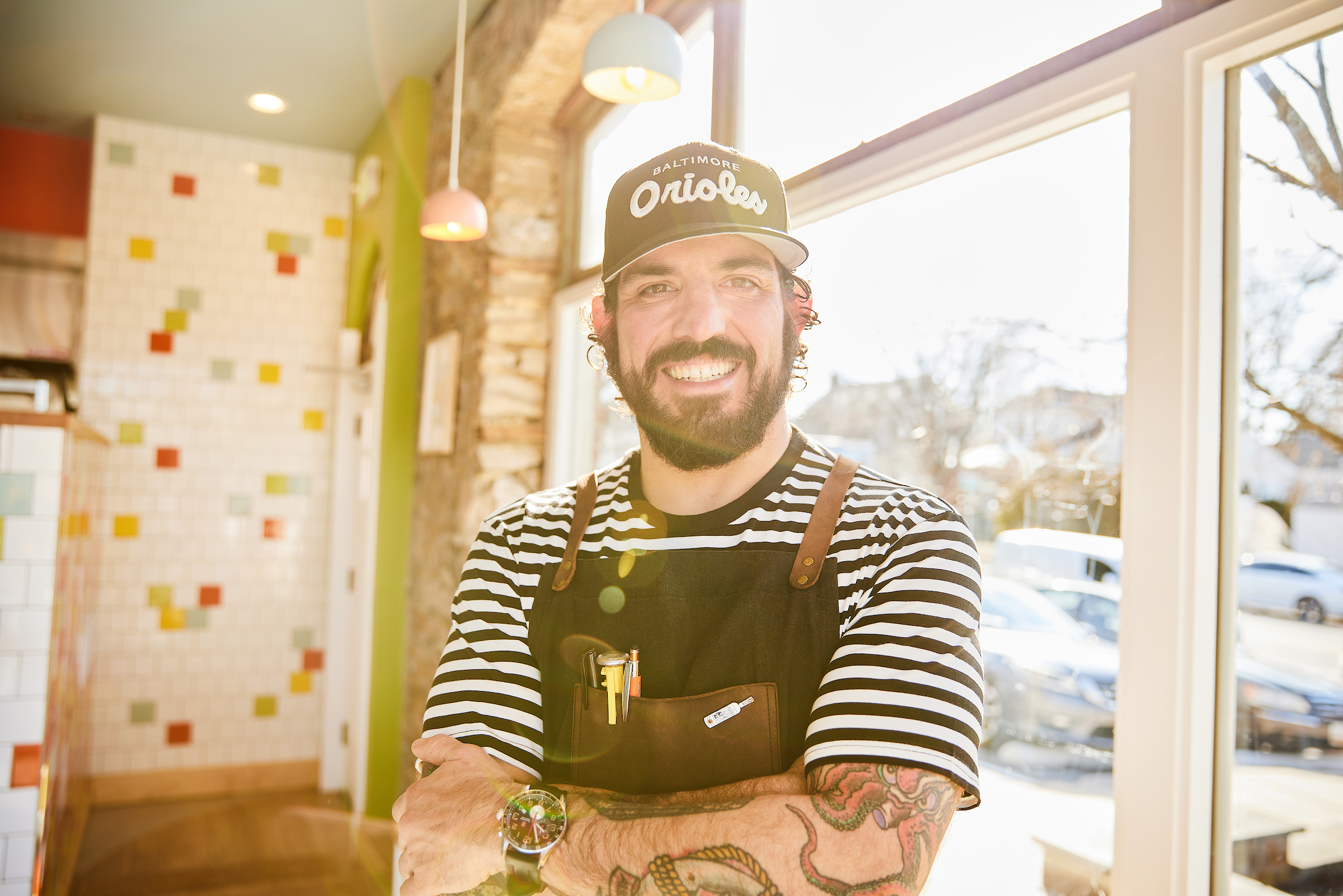
How Raba handles his own history is evident in how he runs his kitchens—with both authority and compassion—and also how he runs his other primary project, the jiu-jitsu gym Guardian Baltimore, housed a few doors away from Clavel. Raba, who is a black belt in Brazilian jiu-jitsu, opened Guardian in 2018 as a nonprofit gym for adults and kids as part of a program founded by a longtime friend in Oakland, California.
Children from 4-17 train for free, and some of the adults who come to work out also bring their kids along to watch and spend time, as the gym is purposely engineered to be a safe, family-friendly space. When he’s not in the kitchen, Raba trades his apron for a black gi, the kimono-like uniform worn by practitioners of the sport.
The same combination of focus and fire that Raba employs in his kitchens is evident on a Saturday morning at Guardian, as he gives pointers to others sitting barefoot and cross-legged on the charcoal mats, laughing and chatting before the group breaks into pairs. Soon Raba is spinning and lunging in a series of intricate training moves, his black hair slicked with sweat.
“Cooking is my culture; jiu-jitsu is a passion,” says Raba.
It’s a passion that extends to his family, as his brother is a frequent participant and his wife is the nonprofit’s managing director. Their children, nine-year-old Lucas and seven-year-old Camila, take classes at Guardian twice a week, though Claudia prefers yoga to jiu-jitsu and practices in the nonprofit’s upstairs studio. Lucas was all of seven months old when his parents relocated from Takoma Park to Baltimore to open Clavel—moving into an apartment above the space that would become the restaurant.
“[We lived there] before it opened, when it opened, and when I was pregnant with my second,” says Claudia of the Remington apartment. After two years of living above a popular bar and taquería, the young family moved, first to a house near Patterson Park and then to another less than a mile from Nana.
“Everyone knows everybody,” Claudia says of the neighborhood, where she now works at the same Montessori school that her kids attend. “It’s just incredible to see everything that’s led up to here,” she says. “I’m really excited to see where this takes him, in terms of the city and the world.”
“Our families got forged together,” says Harlan, “and that’s how Clavel came to be. It wouldn’t have happened any other way.”
As for Nana, says Harlan, “It was a natural progression. It’s this thing where you create a beautiful thing, and then you learn a lot and you’re capable of doing more, and why wouldn’t you want to?”
Clavel has been open nine years now, she notes, Raba’s kids are older, and Guardian has gotten up and running.
“He spaced it out really well,” Harlan says. “At Nana, he’s going to be able to express himself in a way that’s outside the parameters of Clavel.”
“AS I GET OLDER, FOOD MAKES MORE SENSE TO ME. [THERE ARE] FLAVOR PROFILES THAT I DIDN’T SEE BEFORE.”
Nana is intentionally at the opposite end of the culinary spectrum as Clavel: There are no beautifully set tables, no award-winning cocktail program, no late-night bar scene. It’s a family spot, designed for quick, wholesome food and take-away dinners to feed waiting households. Across the street from the Charmery ice-cream shop and a block away from Stoneleigh Lanes—one of the last duckpin bowling alleys in the state—Raba’s taquería is as much like a community center as it is a restaurant.
Many of the staff of 20 are Clavel alums, and there’s a camaraderie in the kitchen that’s deeper than the few months the place has been open, which is also by design.
José Machorro, who runs Nana’s line, is all of 19. He came to the U.S. from Mexico when he was 14 and has been cooking in restaurants ever since. Josh Weinstock, Nana’s manager, came to Nana from jiu-jitsu, and holds a black belt. All the tips at Nana are shared; there’s a 12-percent “taquero service fee” added to all bills.
“Being a taquero is a craft,” says Raba “It’s something that cannot disappear. Food is based on memories. Even though I was kicked out of my country by violence, I am very proud to be a Mexican.”
The word community comes up a lot in conversations with Raba. “Helping them is helping myself. I’m building a stronger community,” he says of his crew, both at the restaurant and in the gym.
Before Nana opened, he was popping up a lot around town—first in a tent outside Ekiben’s Fort Avenue location for an event with Steve Chu; and then in December, at a Ravens’ tailgating party in the M&T Bank Stadium parking lot, serving chile-spiked goat birria hat he cooked on the stoves at the yet-to-open Nana. (The goat was a play on G.O.A.T. and the remarkable career of the Ravens’ retired safety Ed Reed.)
“When we were kids, I’d live vicariously through him,” says Enrique of his younger brother, whom he remembers pushing in a laundry basket down a circular marble staircase when they were children in Mexico. Enrique, who was leaning against a parked car watching his brother grill tortillas outside of Ekiben, lives in College Park and has worked for the Department of Transportation for nearly two decades. “He was fearless. Energy-wise, he’s always been like that. His intensity shows, in jiu-jitsu and in the kitchen.”
“I was a very angry person,” says Raba of his younger years. “You have to calm yourself, have an awareness of feelings and emotions, for mental strength. Jiu-jitsu helped me. It gave me friends and family.”
That intersection of friends, colleagues, students, and family is evident in all the spaces Raba has built for himself. “Baltimore gives chances and opportunities that other cities don’t, which is important,” says Raba, expertly plating a few more tacos, then surveying his crowded, light-filled dining room. “Making a community. What’s more important than investing in your own city?”